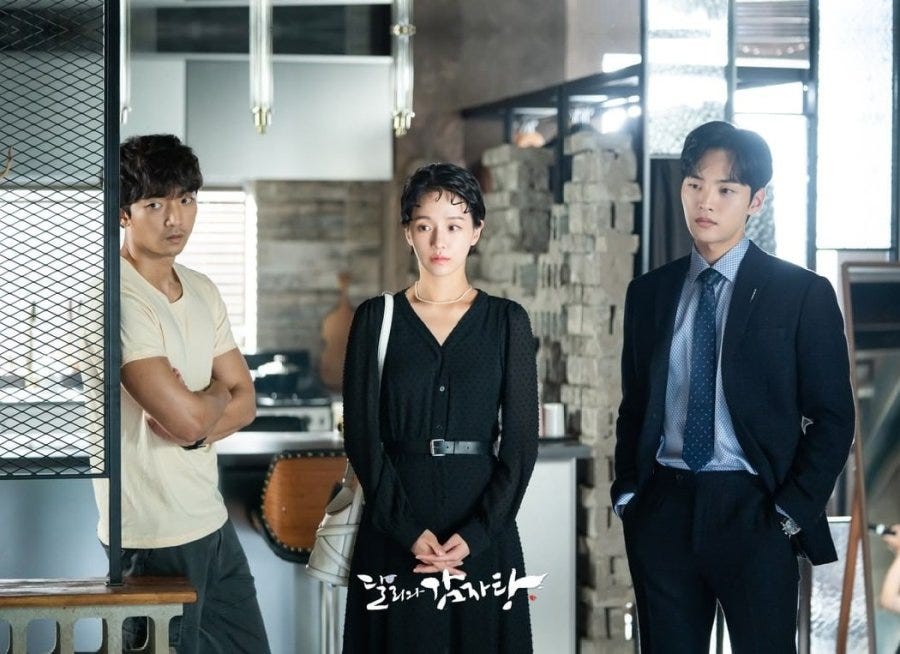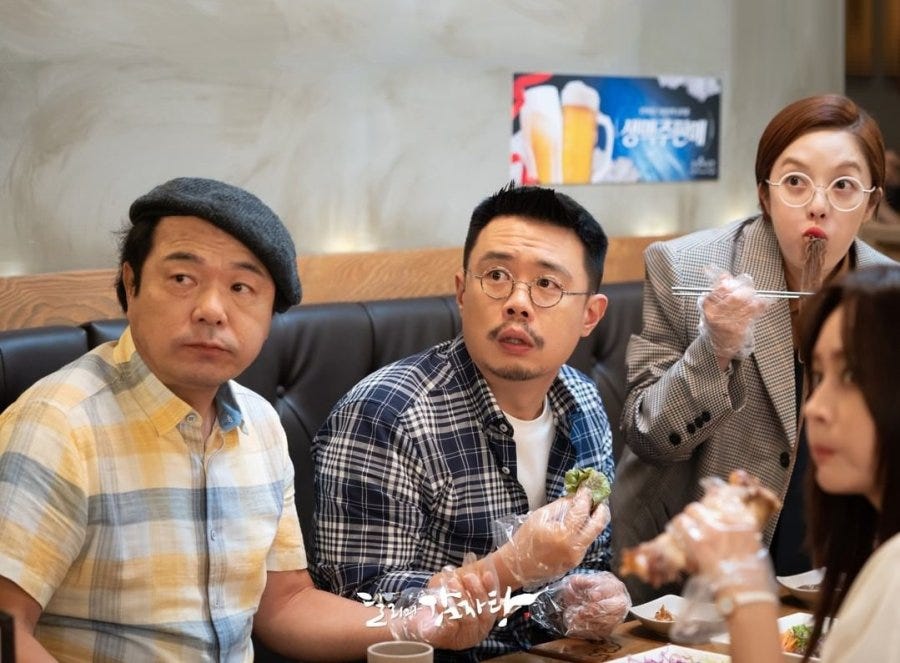Spoilers ahead…
When I picked up this show out of curiosity some weeks ago, I had no inkling then that this show and its lead characters would become a fixture in my drama-watching psyche. The premise offered possibilities but one never really knows what to expect from these types of stories. It’s been the biggest surprise that I find myself ridiculously invested in the outcome of Dali and her not-so-cocky prince as they navigate the rocky path of true love.
Of late (Episode 12 especially) the rogues parade of Unlikeables, true to their form, have evolved into characters from a Charles Dickens novel. The urge to punch, slap and throttle someone has been overwhelming and there’s no lack of candidates to fill that unholy spot. Thankfully Moo-hak makes his appearances equipped with his monologues to take the edge of things. There’s little doubt that he has the best lines in the show. And they’re very calming because at least some of the time common sense prevails in a time of utter lunacy. It acts as an antidote to the moral topsy turvy that pervades the rarefied air of the wealthy set. The baddies whose impulse to acquire seem insatiable, appear to be getting away with murder for now. Or at least the slander of a good man’s reputation.
For a guy who didn’t get ahead by having his nose in books, Moo-hak is dripping with pearls of wisdom. I could live on them for weeks. Here’s the first gem when the hesitant Da-li asks him if he knows she’s adopted:
I did.
Doesn’t it matter to you?
Should it? Well, my brother and I aren’t biologically related either. He’s the son of the woman my father’s living with. Well, he’s still my brother. But so what? Just because you’re adopted, does that change who you are? Did you not answer my calls because of that? Are you a kid? What is this nonsense? You got me all worried and anxious.
Ms Da-li. When I was young, I prayed every single day that my father, not my mother would die. A certain father who is considered successful and respected by society hits his daughter. And a certain son, changed his name to become the son of a rich man when his birth father was alive and well. And a certain daughter is risking everything she has for her late father. In our world, relationships with our parents are as diverse as the paintings. That’s my point.
Here’s the another goodie from the show’s unlikely sage as he dishes out some choice words to his father and stepmother who were conducting an affair under his and his mother’s noses and now they’re trying to meddle with his relationship with Da-li:
You know I always listen to my mother, right? Mum asked me not to hate you. That’s why I tried so hard not to hate you. But it was unbelievably difficult. No matter how I much I thought about it and pondered, I found it unbelievably difficult. “Was he possessed by something? What drove him crazy? How could he do this? What made him leave his dying wife and ignore his baby son in her arms?” But I finally realized it after I fell in love. I see. My father was in love too. That’s probably why he did this. He couldn’t mind his dying wife or the son she had. That’s the thing about love. Your eyes can only see the one you love. You don’t care what people think. You don’t care about morals, law, ethics or your family. Those all seem meaningless. That’s… That’s how much I tried to understand you. But if you do this, I can no longer listen to my mum. I can’t understand you anymore. I’m done.
What?
I’m done trying to understand you. I’m done. You can live your own life. I’ll live on my own.
One of the things this show does incredibly well is how it uses the leads to strip bare the hypocrisies of both of their worlds, so to speak. The public revelation that Da-li was Kim Nak-cheon’s adopted daughter led to egregious shaming by the uncle who later has the gall to get on his knees and beg her to reconcile with Jang Tae-jin so that the latter can saunter in and rescue the Cheongsong family name from a fate worse than death. It’s a role Tae-jin is only too eager to play to get the girl. Moreover it’s bad enough that the uncle’s son, Si-hyung has been such a thoroughgoing reprobate but now Da-li the so-called outsider who has no blood relation is being pressured to clean up the mess that the cousin’s been a party to. One could even make the argument that she’s being asked to prostitute herself to save the incompetent and rather useless male figures who make claim to the Cheongsong bloodline. With the man who ditched her unceremoniously five years ago no less. It’s not only embarrassing but reprehensible.
Episode 12 is also the moment of truth for the seemingly long-suffering curators of the gallery. Prior to going incommunicado, Song Sa-bong battles it out with Moo-hak in the boardroom about what constitutes success in gallery terms. He looks at the numbers, she pontificates the importance of educating the public. It’s a set-up for what comes later when the enemy forces makes an offer she can’t refuse — a more lucrative position elsewhere. The show is sympathetic to her plight. Ms Song has an invalid mother in an aged care facility and she can’t live on air. But the point is — money is important and no gallery, whatever someone thinks about it’s relative importance to society, can subsist without a lot of it. The fact is Song Sa-bong has double standards. The same applies to Han Byeong-se who is tempted by an overseas music scholarship for his talented pianist son. No one would begrudge a father such an opportunity but so far he’s also cowardly avoiding having to give Da-li the bad news.
The curators here represent the educated elites who thumb their noses at the likes of the working class types like Moo-hak. When they’re in their element, the two of them sprout their high-minded principles about the importance of art and pooh pooh Moo-hak’s valid concerns about money issues. However, when they are enticed into jumping ship for some serious financial benefits, money talks loudly. Moo-hak might be bald about his love for money but he’s not the only one who loves it.
It’s also in the case of the Jin family that while wealth offers comforts and luxuries, it doesn’t automatically provide them with any genuine respectability as that comes from character — which seems to be in short supply all round not just in the Jin family. Moo-hak’s monologue about children and their parents is a powerful statement not just about the complexities of nature vs nurture but an antidote to the divisive tribalism of our day. Character matters far more than immutable characteristics.
There are those in this piece of theatre who have the veneer of respectability that wealth and/or status affords them. Assemblyman Ahn and Jang Tae-jin are certainly the ones under the spotlight here. Jang Tae-jin is particularly despicable because he comes bearing gifts of love and friendship while playing sleight of hand. I am inclined to believe that he cares about Da-li but if he really believes that he can buy back her love with his wealth he might not understand her as well as he thinks. One might almost accuse him of being crass. The very sin that he deems Moo-hak guilty of.
I’m not fond of the term second male lead and I certainly don’t see Jang Tae-jin in that light even if he’s trying to woo the lady in question. To me he’s more accurately characterized as a villain because ultimately he is positioned as someone actively working against the leads — their romance and their business interests. Whether or not he is the villain, the real mastermind behind the recent madness remains to be seen.







Thank you for sharing your insights! I've been surprised at how invested I've been in this drama as well. Looking forward to the characters' development in the last 4 episodes and hopefully things will wrap up nicely without any huge issues, plot-wise! :)